
Oct
AJEE Collection of New Notes: Access to Justice Amid War in Ukraine Gateway
AJEE Collection of New Notes
Access to Justice Amid War in Ukraine Gateway
The AJEE Gateway ‘Access to Justice Amid War’ helps to share quality research results in a timely manner. As a founder of this initiative, I believe it contributes to continuing and developing the latest research in the area of law in wartime. This time, we collected a few notes related to legal developments in wartime.
Iryna Izarova, Editor-in-Chief
Our Notes:
Natalia Antonyuk
The dynamics of amendments to the Criminal Code of Ukraine after the start of the war show that the criminal law was not sufficiently ready for application during the war. First of all, a number of acts that are socially dangerous have not been singled out as criminal acts. Some existing articles needed to be amended to differentiate criminal liability.
It is possible to state that collaboration activities have a high level of public danger and should therefore be criminalised. The severity of punishment for such actions depends on the type of collaborationism. Scholars and law enforcers in countries analysing Ukraine’s experience and changes in criminal law in connection with the war should clearly delineate the criminal range of acts of treason and analyse whether there are any socially dangerous acts that are obviously harmful to national security but remain outside of the notion of treason.
Maya Khater
This study seeks to discuss the grounds used by the Russian authorities to legalise their war against Ukraine, indicating the falseness of these grounds and considering the efforts of the United Nations and the International Community that aim to cease Russian aggression against Ukraine. It aims to demonstrate the falseness of Russian legality in its war against Ukraine by identifying the violations and crimes related to the Russian attack under international laws and norms, including the Charter of the United Nations, rules of international humanitarian law, and international human rights law, emphasising on the potential accountability mechanism for perpetrators of international crimes during the Russian war against Ukraine.
Russia has used military force against Ukraine several times since 2014 and seized several Ukrainian critical and strategic locations, including them in the Russian territory, coinciding with escalating protests by Pro-Russian separatist groups, especially in Donetsk and Luhansk, where these groups declared their independence in February 2022. Furthermore, Russia has declared it started a special military operation aiming at peacekeeping in those two regions, in addition to claiming that its intent was to stop genocide crimes undertaken by Ukraine in the eastern region of Donbas. This research concentrated on the legality of the latest Russian military operations that started on 24 February 2022 from the perspective of contemporary international law.
MILITARY JUSTICE IN UKRAINE: RENAISSANCE DURING WARTIME
Oksana Kaplina, Serhii Kravtsov, Olena Leyba
In this article, the authors raise issues that are relevant for the modern legal system of Ukraine, related to the need to revive the military justice system and, in particular, military courts. The authors emphasize that during the peaceful existence of Ukraine, a dangerous illusion was formed in the society regarding the unnecessary functioning of military justice in the state, however, unforeseen realities fundamentally changed the liberal ideas of peacetime.
Oksana Kaluzhna and Kateryna Shunevych
The researchers outline the range of war crimes and note the lack of systematisation due to the non-ratification of the Rome Statute by Ukraine, which significantly complicates the qualification of crimes for practicing lawyers. The authors then analyse such mechanisms of bringing the military, officers, and officials of russia to justice as: а) the International Criminal Court (ICC), b) ad hoc tribunals, с) the European Court of Human Rights (ECtHR), d) national judicial systems on the principle of universal jurisdiction e) criminal proceedings of Ukraine, f) eclectic forms of cooperation of justice bodies of Ukraine with foreign and international partners, together with the chronology of the first steps for each.
Oleh Ilnytskyy
Judicial control and authorization of state coercion or other interference in the sphere of private legal interest is a universal standard for building a political and legal system based on the principles of the rule of law. To obtain reliable and substantiated conclusions, general and special research methods were used, which processed the results of theoretical research on the problems of administrative proceedings in Ukraine, materials of legal practice in the form of conclusions of international human rights institutions and Ukrainian courts.
TRANSFORMATION OF BAR IN WARTIME IN UKRAINE:
ON THE WAY TO SUSTAINABLE DEVELOPMENT OF JUSTICE
(ON THE EXAMPLE OF THE ODESA REGION)
Oksana Khotynska-Nor and Nana Bakaianova
This article presents the analysis of the peculiarities of functioning of the Bar of Ukraine in wartime on the example of the Odesa region. Its choice is due to the history and ancient traditions of Odesa Bar, whose representatives have already experienced periods of military aggression, and the available information about the results of its activity in wartime in the modern period. In wartime, it is impossible to obtain and systematize such data regarding the whole territory of Ukraine because part of the state is under occupation, and active hostilities are taking place on the other part.
Yuriy Prytyka, Iryna Izarova, Liubov Maliarchuk, Olena Terekh
This study is designed to analyse the consequences of armed aggression against Ukraine and the introduction of the appropriate legal regime in such areas as the realisation of property rights, the administration of justice, the enforcement of court decisions, and labour relations.
ADMINISTRATION OF JUSTICE DURING MILITARY AGGRESSION AGAINST UKRAINE: THE ‘JUDICIAL FRONT’
Oksana Uhrynovska and Anastasiia Vitskar
This article is devoted to the study of the peculiarities of the administration of justice in the context of the large-scale military aggression of the Russian Federation against Ukraine. Within this framework, the authors carried out a detailed analysis of the recommendations on the work of courts in martial law provided by the Council of Judges of Ukraine and the Chairman of the Supreme Court. Taking into account the recommendations adopted during the conditions of martial law and the current jurisprudence formed at that time, the peculiarities of civil proceedings in martial law were singled out and analysed in detail, focusing on a specific procedural institution.
Oksana Uhrynovska and Yurii Onyskiv
The armed aggression against Ukraine has been started in 2014 when Crimea and part of Ukrainian territory were occupied. It led to the disappearance of number of people and the new notion of missing persons amid military conflict appeared in the legislation of Ukraine. The new law defines the concept of persons who have disappeared due to special circumstances and in connection with a military conflict. The difference between this institution is that the recognition of a missing person is primarily aimed at protecting these persons. The status of a missing person within military conflict provides a person with a number of guarantees in order to protect his/her rights and assist in the search for that person. However, today the implementation of this institute is incomplete. This study aimed to discover the gaps that prevent the full protection of the rights of missing persons and to optimize the activities of the authorities to protect this category of persons, based on the national legislation and case law. It was also discussed the Institution of the Commissioner for Missing Persons in Special Circumstances was introduced in April 2022, aimed to coordinate the authorities, law enforcement agencies on the search for missing persons.



